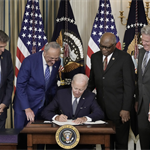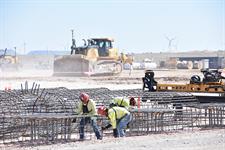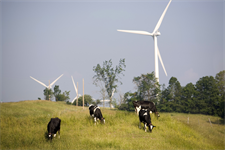Opinion: Massachusetts’ climate bill is a blueprint for US carbon neutrality
Energy Disrupter

This landmark bill is going to be crucial, not only for the state of Massachusetts, but also the entire Northeast and ultimately the whole country.
Huge step forward
The initiatives included in the bill covered many areas, such as allowing cities to ban fossil fuel hookups in new buildings and the creation of new investment funds for nuclear and geothermal research. It also put new programs in place for the adoption of electric vehicles. Largely, the bill is a huge step forward for the production and installation of new wind farms, especially offshore.
This bill reforms the state’s offshore wind procurement process, and reaffirmed the state’s commitment to installing 5,600 MW of offshore wind by 2030. The policies in the law also support the development of this huge fleet through supply chain advancement, workforce development and infrastructure investment.
The support from this bill that the industry is receiving is imperative to the success of the industry as a whole, and likely will need to be repeated by other states if the entire U.S is going to achieve carbon neutrality.
For Massachusetts to hit the 5,600 MW goal by 2030, it will require even more innovation in the production and installation of offshore turbines. To aid in this, the Massachusetts Clean Energy Center will administer an investment program to stimulate the supply chain and labor pool. This is important, because the sector can only grow as quickly as new workers are being trained.
Offshore is still a risky investment for the private sector, especially with how ‘new’ offshore development is in the United States. To help offset the risk and propel these projects forward, the bill allows for up to $35,000,000 for an offshore wind tax incentive program. The new law is also going to scrap the current price cap that forces new offshore projects to offer power at a lower price than the one brought online before it. This will increase the number of bids for future offshore sites, speeding up the rate the state reaches its 2030 targets.
To push production further, this bill will now allow Massachusetts to team up with other northeast states to develop bids for offshore and onshore wind in places like upstate Maine, which are ripe for new renewable energy assets. It also adds new requirements when selecting bids, giving additional weight to bids with employment opportunities for low income and minority workers, supply contracts with minority and women-owned businesses, project labor agreements and job training, and investments in manufacturing. And now, when selecting winning bids, only the Department of Energy Resources is in charge – large investor-backed utilities will no longer have a say in which contracts should be considered.
To accommodate the additional energy to the grid, the bill established a working group to study and develop the best way to work with other states in New England to upgrade existing lines and increase transmission capacity. It also authorized the Department of Energy Resources to start soliciting bids for the transmission systems that will be required for the offshore sites.
Other states must follow
All of these new initiatives and incentives come at a time where the industry truly needs it – and other states must begin to follow suit. The more that each state works together to solidify the growth of renewable energy, the easier it will be for the private sector.
The downside to this bill, as a result of the way law-creation works in Massachusetts, is that the funding for the initiatives is not included. Funding will need to come from a second bill which has been previously rejected. While the $4.5B infrastructure act to accompany this law has not been passed, both sides of the aisle in the state legislature have promised to continue negotiations.
Other states across the country need to use this bill as a framework for their future climate and energy bills. States will be able to develop new laws that will similarly upgrade infrastructure to support the speedy growth of clean energy – and the private sector is waiting for it. With the IRA recently being passed, it is now or never for the individual states to establish their support of the industry.
Edward Wagner is chief revenue officer at Windesco
















